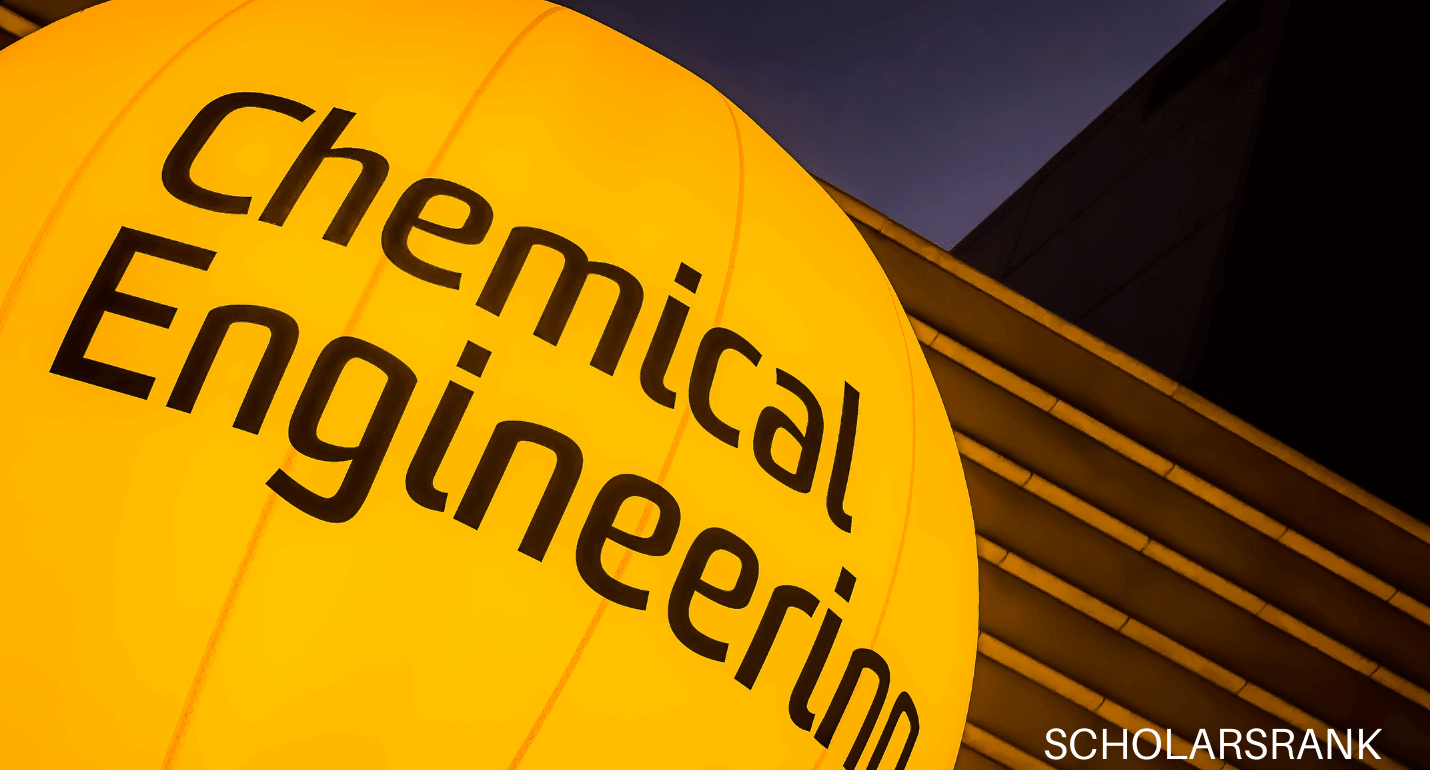Introduction

Is A Masters In Chemical Engineering Worth It? Chemical engineers research chemical components and devise production methods for a variety of goods, many of which advance human health. Enroll in one of the top master’s programs in chemical engineering if you have an aptitude for science and want to contribute to the fields of energy, healthcare, manufacturing, or biotechnology.
Students who pursue a master’s degree in chemical engineering will become proficient in handling and testing diverse chemicals as well as adequate research methods. They will also be better able to comprehend how engineering concepts and procedures might be used in the study of chemistry.
The main criteria for admission, the application procedure, and the courses offered at various institutions are covered in this article. It also discusses the types of careers you might anticipate holding with a master’s degree in chemical engineering.
Is A Career In Chemical Engineering Worthwhile?
Yes, a career in chemical engineering is rewarding. Chemical engineering is a fulfilling and fascinating career path that is in high demand across a variety of manufacturing industries and pays highly. Chemical engineers, for instance, who work in the oil and petroleum industry, can make more than $150,000 annually.
Because they transform raw materials into usable products, saving costs and optimizing efficiency while maintaining or improving the quality of goods and materials, chemical engineers are frequently referred to as “universal engineers.” They are hired in almost all the industries, including the industries related to consumer goods, medical, biotechnology, material, manufacturing, and fuel.
Chemical engineers increase access to clean drinking water, create novel textile fabrics, recover and refine fuels, create solutions for environmental problems, or enhance illness diagnosis and treatment.
Particularly in the manufacturing industry, chemical engineering is in demand. For instance, the job experience outlook is predicted to be 9% from 2020 to 2030. In line with this, worries about the environment and sustainability have prompted many industrial companies to engage chemical engineers to investigate novel eco-friendly materials.
Is A Masters In Chemical Engineering Worth It?
For many students, a masters in chemical engineering is worth it. Controls for air pollution, the design of engineering experiments, chemical engineering thermodynamics, combustion theory, and theories of explosives are only a few possible study topics.
A Master’s degree in Chemical Engineering can help you get ready for a range of positions. Engineering managers, chemical engineers, health and safety engineers, occupational health and safety specialists, and chemists and materials scientists are common professions in this area.
According to the Bureau of Labor Statistics, there will be a 3% increase in employment for those in the architecture and engineering fields through 2029. Particularly for chemical engineer positions, job growth is predicted to be 4%.
What Is a Master’s in Chemical Engineering?
A master’s degree in chemical engineering is a postgraduate academic credential obtained by students who have met the requirements set forth by a recognized university or college. This degree attests to the student’s successful completion of 24 to 45 credits worth of chemical engineering and associated engineering coursework for one or two years.
Additionally, it demonstrates that the student engaged in independent research and study that honed their engineering design, scientific analysis, and engineering applications skills. Graduates will be ready for jobs in chemical manufacturing, such as the transformation of organic materials into products including food, plastics, polymers, and mechanical devices.
How Valuable Is a Chemical Engineering Master’s Degree?
For those who want to become experts in a particular field of chemical engineering, a master’s degree in chemical engineering is crucial. The courses are structured around particular career routes, so once you graduate, you should be well-prepared to get employment and start working in your field of choice.
With a master’s degree, you can succeed. You can start your own business or use your in-depth understanding of raw materials and production techniques to work in labs producing goods for a variety of sectors. With a master’s degree, students have the option of continuing to a Ph.D. program, which opens up job opportunities in academia and government research centers.
Which Master’s Degrees in Chemical Engineering are Available?
In chemical engineering, you can get a Master of Science (MS) or a Master of Engineering (MEng). The prerequisites for each school’s degrees vary, but in general, the type of work required for an MS and an MEng is distinct. While an MS includes a research project or thesis, an MEng often focuses on coursework and is a non-thesis option.
What Are the Admission Requirements for a Master’s Degree in Chemical Engineering?
Each school has its standards for admission to the master’s program in chemical engineering. On the graduate school admissions page, you must fill out an online application form, and you must submit a transcript from a US college that is accredited or from a non-US institution that is equivalent.
Your transcript should ideally show that you majored in engineering or that you’ve accrued enough credit hours in mathematics, physical sciences, and life sciences. For your application to be processed, you might have to pay an application fee. Typically, costs are less than $100, however, those for overseas students may be higher.
A 3.0 GPA, letters of recommendation, a statement of intent, and an evaluation of English language skills are additional prerequisites for admission to a chemical engineering master’s program. Some programs demand the Graduate Record Examination (GRE) from candidates, and others demand that international students take the TOEFL or IELTS tests to demonstrate their English language skills.
How Long Does It Take To Acquire A Master’s Degree In Chemical Engineering?
A master’s degree in chemical engineering can be earned in two years. Depending on your program, this may differ because many academic departments divide their requirements into semesters rather than years of study. The majority of institutions anticipate that students will finish their programs in three or four semesters.
Each semester, a specific amount of credits must be earned. A semester for a Master’s in Chemical Engineering normally consists of six to fifteen credits, depending on the classes you’re taking and whether you’re engaged in any research. A faculty advisor may be able to help you create a degree plan that accommodates your circumstances, such as part-time study.
What Courses Are Required for a Chemical Engineering Master’s Program?
Engineering research, scientific analysis, computational science, engineering design, and engineering application and innovation are among the courses you must take to earn a master’s degree in chemical engineering. Check out our collection of well-liked engineering courses to develop the abilities necessary to succeed as a chemical engineer.
- Biochemistry
The interaction of chemical and biological processes at the cellular level in living things is the subject of biochemistry. Among the topics explored in biochemistry are metabolic engineering pathways, protein engineering, tissue engineering, control mechanisms, and biomolecular structures and functions.
- Microfabrication
A developing production technique in the microelectronics sector is microfabrication. This is a collection of procedures and methods used to alter raw materials to produce structures as small as a micrometer. Microsystems, structure fabrication, lithography and patterning, test structures, and layer generation are some of the topics addressed in this subject.
- Thermodynamics
The science of thermodynamics examines how heat interacts with different types of energy. Students in chemical engineering learn about thermodynamics to understand how chemical energy behaves in various constrained physical states. Students study calculations for work and efficiency as well as the rules of heat transport, heat cycles, and molecular thermodynamics.
- Biotechnology
Biotechnology focuses on the study and utilization of biological processes to address problems in the production of food and medicine. When building technological systems and software across industries, students learn how to use biological processes and systems. Genetics, bioprocessing, biological molecular engineering, and immunobiology are among the topics covered.
- Engineering management
Engineering management integrates business management, leadership, and engineering problem-solving skills. For chemical engineering students who are interested in consulting and entrepreneurship, this emphasis is perfect. Ethics, project management, quality assurance for engineering projects, marketing, and financial management are among the subjects that students take coursework in.
Career Options For A Master In Chemical Engineering
Do you aspire to a position in chemical engineering? You’ve chosen a really interesting career! You can contribute to the search for innovative methods to enhance daily items like the clothes we wear, the food we consume, or the machines we use as young and ambitious chemical engineers. However, you must first earn a degree in chemical engineering.
You can contribute to the global reduction of disease, poverty, and malnutrition by obtaining a Master’s degree in chemical engineering. Or perhaps you’d prefer to concentrate on the environment, developing strategies to counter acid rain, lead contamination, the greenhouse effect, or discovering more effective ways to conserve energy? You’ll have plenty of chances in either case to improve the planet!
- Environmental Scientists and Specialists
Environmental scientists and specialists collaborate with governmental organizations to develop new environmental protection regulations and to find strategies to alter human behavior to prevent future environmental issues. People who choose to work in the research industry frequently need to create grant submissions to obtain financing for a specific project. These same people gather environmental samples of the water, soil, air, and food and analyze them to pinpoint any potential environmental issues. While someone with a bachelor’s degree can still get the job, a master’s degree will allow them to advance more quickly inside their current business.
- Postsecondary Chemical Engineering Teachers
A Ph.D. is typically required for postsecondary chemical engineering instructors at universities, however, most community institutions just require a master’s degree. Students are taught about the physical, chemical, and compositional changes of substances by those who operate in this field. They instruct students in the fundamentals of engineering so that they can create tools, materials, services, and machines. They also shed light on the qualitative and quantitative approaches used in chemical analysis. Additionally, they frequently assist students with their research and laboratory projects and offer advice on how to utilize and maintain the lab’s equipment.
- Chemical Engineers
To increase the quality and output of food, chemical engineers help to improve fertilizer formulations and food processing methods. They also aim to design pharmaceuticals that are safer to use and more economical, as well as novel textiles for garments that increase comfort and water resistance. They also decide the safety precautions that must be taken when handling harmful compounds. With a master’s degree, potential employees will have more experience working in laboratories, making them the best candidates to lead research teams.
- Natural Sciences Managers
Managers in the natural sciences guide physicists, chemists, and biologists while they conduct research. They are in charge of production, quality assurance, and testing processes as well as sample production and collecting. These same people keep a close eye on the lab’s tools and supplies to make sure everything is operating as it should and that there is always enough to work with. Additionally, they recruit, manage, and regularly evaluate their workforce.
- Chemists and Materials Scientists
Chemists and materials scientists must obtain a master’s degree or above to work in research and development. They examine the qualities of diverse sorts of matter, its composition and structure, as well as the scientific laws governing them, during this inquiry. They also instruct other scientists and lab workers on the procedures involved in chemical testing and processing. In chemical factories, frequently oversee production and enforce quality control guidelines.
Chemical Engineering Vs Mechanical Engineering
Although there are many areas where chemical engineering and mechanical engineering overlap, the following are the main distinctions between the two fields of study:
| Chemical Engineering | Mechanical Engineering |
| Emphasizes the creation of products through manufacturing | Focuses on creating and testing the tools and machinery used in the creation of products. |
| Closer interaction with chemicals and potentially harmful materials. | Concentrates more on mechanical and technical concerns with machinery. |
The development of products involves both chemical and mechanical engineering to a significant extent.
Chemical Engineering Vs Biochemical Engineering
Although both Biochemical Engineering and Chemical Engineering are subfields of Chemistry and share many similarities, there are distinct domains of various techniques. Chemical engineering involves creating finished products using raw materials by applying chemicals to change their chemical or physical composition, structure, or energy content. Biochemical engineering deals with the various bioreactors that are used in the production of food products, pharmaceuticals, and waste treatment.
| Chemical Engineering | Biochemical Engineering |
| The area of engineering known as chemical engineering is concerned with the planning and management of industrial manufacturing facilities. It is a branch of engineering that deals with creating goods like chemicals and other things out of raw materials that need to go through chemical processing. Chemical plant design, installation, pharmaceutical plant design, and other topics are covered in the course. The technologies employed in the chemical industries, such as the mineral, petroleum, synthetic fiber, and petrochemical sectors, are also covered in chemical engineering courses. | Biochemical engineering is the application of chemical engineering principles to industrial processes that rely on biological elements like live cells or their constituent parts. Examples include the production of valuable chemical compounds like antibiotics and other molecules using microorganisms and enzymes. Therefore, the field of biochemical engineering is where “how cells behave in a reactor” is explored. |
Conclusion
Is A Masters In Chemical Engineering Worth It? Yes, a masters in chemical engineering is worth it because you can acquire the knowledge and abilities necessary to be eligible for lucrative careers in the engineering profession by pursuing a master’s degree in chemical engineering.
With your degree, you might be well-suited to work in the production of a variety of goods, including those related to electronics, food, coal, petroleum, and clothes.
A master’s degree can also help you become eligible for community college teaching positions and leadership positions in the engineering industry. You might even be able to complete an accredited master’s in engineering degree while continuing to fulfill your other career and life obligations.
If you want to advance in this profitable sector, look into master’s degree programs in chemical engineering offered by recognized colleges.
Frequently Asked Questions (FAQs)
What Courses Are Related To Chemical Engineering?
- Biomechanics, experimental biology, electrochemistry, polymer science, bioengineering, petroleum engineering, drug development, process control, atmospheric physics, and thermodynamics are among the subjects connected to chemical engineering. In a degree program for chemical engineering, you’ll take these courses.
Is Chemical Engineering Harder Than Medicine?
- No, neither chemical engineering nor medicine is more difficult than the other. Since both fields are very quantitative and need a lot of problem-solving, students may find them to be challenging. While medicine places a greater emphasis on biology and chemistry, chemical engineering needs a thorough understanding of physics, chemistry, arithmetic, and applied science courses.
Are Chemical Engineers Happy?
- Yes, the majority of chemical engineers are content with their wages, future possibilities, and current positions. Most chemical engineers, according to PayScale, express great job satisfaction. This can be ascribed to their companies’ alluring wage packages and health benefits as well as the rewarding projects they work on.
Can A Chemical Engineer Be An Entrepreneur?
- Yes, a chemical engineer who has the necessary training in chemical processing, research, and development can start their own business. You’ll probably need to register in an advanced chemical engineering degree program to build this understanding. Your expertise will help you land consulting jobs or raise money to create your chemical product.
You can also read on, “Is A Masters In Biology Worth It In 2022?”








